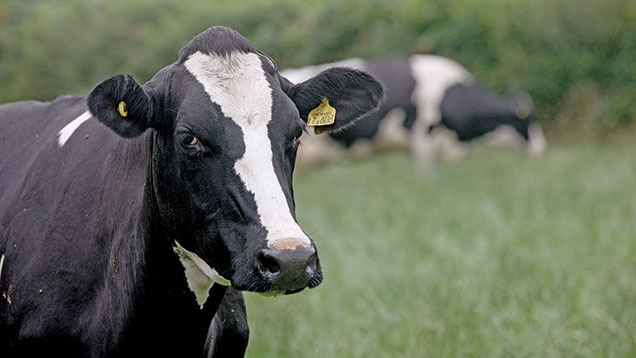Milk price crisis forcing producers to bail out

Traditional family dairy farms could become a thing of the past unless drastic action is taken to support the industry, farm leaders have warned.
George Dunn, chairman of the Tenant Farmers Association (TFA), said more than 400 dairy farmers had already left the dairy industry this year.
It means the number of dairy producers in England and Wales is expected to drop below 10,000 within the next month, In 1996, there were more than 34,000 dairy farms.
“We’re losing the family farming, the grazing systems that we have traditionally known,” Mr Dunn told MPs at Westminster on Tuesday (25 November) during a meeting to discuss the milk price crash.
“There are valleys which have had 20 dairy farmers and have got none in them anymore. Their production is being exchanged onto units which are much larger, looking at yield gains.”
“In the past nine weeks we have passed three individual dairy producers’ details on to the Samaritans because they were in such a desperate state.”
David Handley
See also: MPs suggest compulsory dairy code to protect prices
Consumers need to understand that the pattern of dairy farming was changing to larger production units, he added.
“The retailers and processors are very keen to use the outdoor family farming system as the way they advertise the product to consumers, but in fact, we are losing much of that family farm input because we are going to much larger units.
“I’m not saying there is anything wrong with that, but we need to recognise that it is happening and ask questions about whether that’s right.”
Milk prices had dropped by as much as 8p/litre (about 30%) in the past few months and producer numbers were falling, the Environment, Food and Rural Affairs (Efra) committee session was told.
Mr Dunn said it had been a “horrendous time” for the tenanted sector, but with more price cuts expected and the situation likely to get harder, it could be “just the tip of the iceberg”.
David Handley, a Monmouthshire dairy farmer and chairman of farm lobby group Farmers For Action (FFA), predicted that as many as 5,000 more dairy farmers would leave the industry in the next five years unless measures were taken to secure sustainable milk prices.
“It’s getting a very serious situation now,” he said. “In the past nine weeks we have passed three individual dairy producers’ details on to the Samaritans because they were in such a desperate state.
“I don’t think the full effect has been seen. We have seen another price cut – a very severe one of 1.6p/litre – from Arla. I think that will put the writing on the wall for an awful lot of people.”
Mr Handley said farmers were “suspicious” about processors and retailers blaming global commodity slumps and oversupply for the present crisis when 85% of milk produced here remains in this country.
“Until we start getting some evidence to show that what has gone on globally has contributed to a cut of more than 8p in our milk price, I don’t think you’ll see farmers stopping protests,” he added.
NFU chairman Mr Harrison urged the industry to work constructively with processors to get a better deal for farmers and get some value further down the chain.
“We would also like to see the remit of the groceries code adjudicator extended down the supply chain to cover farmers’ relationships with processors,” he said.
“We believe this would bring better transparency to the effect of the ongoing liquid milk discounting we’re all seeing in our retailers.”
Mr Harrison called on the government to improve labelling and promote high-quality dairy products, both in the UK and abroad.
He said the NFU had written to all the major supermarkets to ask what they were doing to support British dairy farmers.
He added: “A number of dairy farmers are within dedicated supply relationships, but using milk as a loss leader puts downward pressure on the whole industry and while farmers’ margins are being squeezed by global and political issues, we need our domestic retailers to support our farmers more than ever.”

